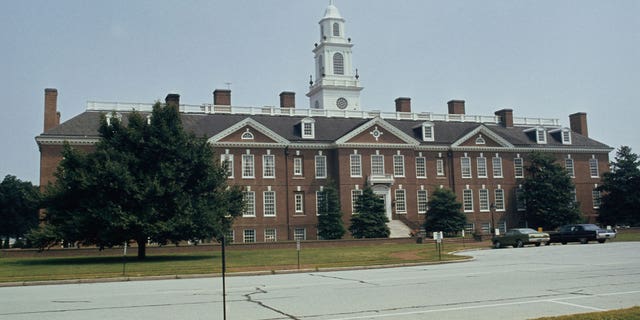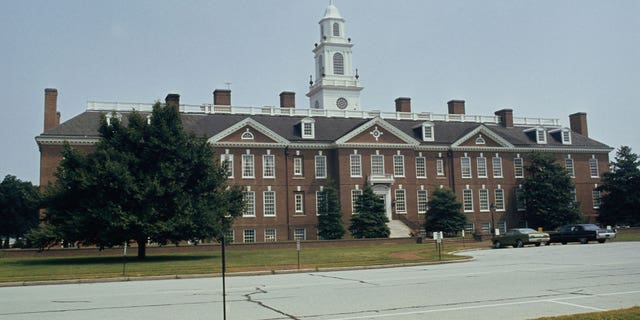
Lawmakers in the Delaware House of Representatives have approved legislation authorizing a small town in the southern part of the state to allow business entities, including corporations and limited liability companies, to vote in municipal elections.
Lawmakers voted 35-6 on Friday for the measure, which was sent to the Senate on the final day of this year’s legislative session. The Senate declined to take up the measure, although it could be revisited when the General Assembly reconvenes in January.
The bill authorizes a charter change for the city of Seaford, one of more than a dozen municipalities in Delaware that already allow nonresident property owners to vote. At least four allow corporate entities and trusts to vote in municipal elections, while others restrict such entities to voting in special elections such as annexations, referenda or bond issues.
FOX NEWS POLL: VOTER TRUST & CONFIDENCE IN INSTITUTIONS HITS ROCK-BOTTOM
Charter changes requested by local governments in Delaware are typically approved in the General Assembly in perfunctory fashion without debate or controversy. Seaford’s charter change, which sets no precedent, nevertheless drew national attention because of media campaigns by opposition groups including Common Cause and the American Civil Liberties Union. The criticism resonated with progressive House Democrats, who refused to vote for the measure.
“This is not a new thing,” Republican Rep. Danny Short, a former mayor of Seaford and chief sponsor of the bill, said Thursday before a failed vote on the bill. “I don’t know why people would criticize a simple charter bill.”
The bill was resurrected Friday following closed-door deal-making by GOP lawmakers and majority Democrats, who control both chambers of the Legislature. Passage of the measure cleared the way for a final vote Friday on a $1.4 billion capital budget for the fiscal year starting Saturday.
The charter change would allow nonresident voting by both a natural person or an artificial entity, the latter including corporations, partnerships, trusts and limited liability companies established in Delaware. Any such entity would have only one vote, no matter how many properties it might own.

A general view of the Delaware State Capitol Building in Dover. Legislation that would allow business entities, such as corporations and limited liability companies, to vote in municipal elections has been approved by the Delaware House of Representatives. (UPI/Bettmann Archive/Getty Images)
A business entity or trust would cast its vote by power of attorney, corporate resolution or affidavit authorizing a designated legal representative to vote on its behalf. A person voting on behalf of a business entity or trust would have to be a resident of Delaware.
In order to vote, an artificial entity would be required to certify the identities of all beneficial owners. Those names would be cross-referenced with voter registration lists to guard against multiple votes on behalf of related entities with common ownership.
According to a survey by the Delaware League of Local Governments, at least 15 municipalities allow nonresident property owners to vote in elections, and at least 12 allow voting by entities such as corporations, trusts and limited liability companies. That list includes Rehoboth Beach, where President Joe Biden has a summer home. Rehoboth is known as “The Nation’s Summer Capital” because of its popularity among denizens of Washington, D.C., some of whom own vacation homes in Delaware.
According to the National Conference on State Legislatures, 11 states allow nonresidents to vote in local, municipal, or special elections. Connecticut, Tennessee and Delaware allow nonresident voting in certain municipal or town elections.
Short said the charter change is aimed at helping economic recovery efforts in Seaford, a town of about 8,000 situated on the banks of the Nanticoke River. Seaford was once home to a thriving DuPont manufacturing facility and known as the “Nylon Capital of the World.” DuPont sold the plant in 2004, and the town lost thousands of jobs.
Seaford town officials, who approved the charter change in April, say business owners who have invested in the town through entities like LLCs and partnerships should have a say in local affairs.
Claire Snyder-Hall, executive director of Common Cause Delaware, criticized the House vote, saying corporations have no place in elections.
CLICK HERE TO GET THE FOX NEWS APP
“In a state with more registered businesses than residents, this bill gives wealthy outsiders the power to override the actual people of Seaford,” she said in a news release.
According to the minutes of the April town council meeting, only two members of the public commented on the proposed charter change, one for and one against. In an election three days later, the resident who spoke in favor of the charter change defeated an incumbent councilman who voted against it.
In an interview earlier this week, Short said critics of the charter change are putting out erroneous information and don’t understand what’s going on in Seaford.
“This is outside people trying to control an entity that actually has home rule,” he said. “In fact, it’s almost hypocritical what they’re doing.”







